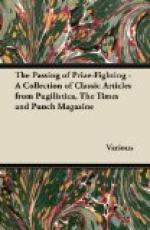One story I remember in particular, though I dare not attempt to repeat it as COBBYN told it. It was about the wretched adventures of a certain travelling companion of his on a shooting expedition in Albania. It was a story that never seemed to cease,—a bad recommendation for most stories, I admit; but in this case so artfully and with such surprising humour and force was it told, so vividly did it depict a long series of ludicrous sufferings culminating in the total loss of the sufferer’s clothes and his involuntary appearance in the full uniform of a Turkish Zaptieh, with other surprising and endless episodes, that at the last we had in the midst of our gasps of helpless laughter to implore the narrator to stop for the sake of our sides and the resounding rafters of the General’s house.
At other times the irresistible WILFRID would pose reminiscently as the gallant protector of outraged virtue, or as the hero of some deathless story of courage and coolness by which empires had been saved from disaster. And he was so persuasive, so convincing, that our imaginations, which would have refused to follow a smaller man on lower flights, soared obediently after him through an empyrean of impossible romance. Nor did he stop at this. General TEMPEST was the pattern of old-world punctilio, but before a week was out he had introduced COBBYN, of whom he knew nothing except what COBBYN told him, to all the best people in Dansington; nor shall I ever forget the air with which this glorious rascal took the portly old Countess of CARDAMUMS down to her second supper at the County Ball. He rode ALEXANDER’S chestnut, and ALEXANDER never murmured. The General’s ancient retainer went on his many errands, and neither the General nor his man saw anything out of the way in the proceeding. Even CLARA looked, I thought, with some favour—but as CLARA always breaks into indignant denials whenever this is hinted, I will proceed no further. As for the members of the Dansington Club they were enthusiastic in COBBYN’S praises. The young sparks imitated his fashions in ties and collars, the old bucks repeated to one another his stories, and one and all vowed he was “an uncommon good fellow, by Gad.”
To me COBBYN was always profusely polite, with that flattering politeness which induces the flattered to think himself just a shade cleverer and sharper and better than his fellow-creatures, and on the day before my departure he honoured me by borrowing a ten-pound note of me and writing my London address with much ceremony on the back of an envelope, which I afterwards found lying about in a passage of the General’s house.




